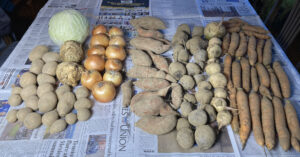

We’ve often noted the many reasons to connect up with a local farm as a farm share participant, which bear repeating.
Freshly harvested food tastes better; buying food from a local farm offering CSA (Community Supported Agriculture) farm shares puts money in the pocket of a local farm family and helps them budget better for the growing season ahead, while protecting local farmland; shareholders in a CSA develop a relationship with a particular farm and farmers and often with other farm share participants, as well as having a personal connection with a piece of our mother earth that can be visualized and experienced; and participants in a CSA diversify their diets and try new foods.
Moreover, farm fresh food raised organically, particularly by farmers who practice regenerative agriculture, has significantly higher concentrations of vital micronutrients or phytonutrients (sometimes referenced as antioxidants and phytochemicals) while conventionally grown crops have significantly higher concentrations of pesticide residue. (It’s rooted in science and common sense to conclude what’s the healthier choice for humans.)
David Montgomery and Anne Biklé in their most recent book, What Your Food Ate, put it concisely, heal our farmland and reclaim your health. And on their website, Montgomery and Biklé share much of their “source materials” which consisted of approximately 1,000 articles. They elaborated on their work in writing What Your Food Ate in our interview last summer.
On the first day of meteorological winter on the winter’s solstice in Albany in upstate New York, daylight lasted a mere nine hours and three minutes, based on info from the remarkable website, time and date, where a user can search for “sunrise, sunset, and day length” for any city or place. One month later, daylight has increased to nine hours and thirty-three minutes in Albany. Progress towards spring and the growing season ahead.
With that extra half hour of daylight, it also became time for this farm share participant to sign up for a CSA farm share for a lucky thirteenth year with Roxbury Farm, an organic (plus!) farm, just 18 miles south of home.
For 2023, the farm share for 24 weeks costs $721 (given current inflationary pressures a modest 4.8% increase from last year’s cost of $688). Similarly, the cost of three deliveries of 30 lbs of storage vegetables next winter (December 2023 to February 2024), for a total of 90 lbs, increased a little more than 6% to $155 from this winter’s $145. Still very much a bargain at $1.72 per pound, a slight increase from $1.61 per pound for organic storage vegetables.
We encourage users of our website to search our directories of CSA farms (with listings throughout the United States and Canada, as well as in England, Scotland and Wales) and sign up for a farm share for the 2023 growing season.
Folks who are not certain that they will be home to pick up a farm share on a particular week should realize that friends or neighbors would be appreciative of the opportunity to enjoy a week’s share. It also may be of interest to know, over the past years, if I’m unable to pick up my farm share (and a friend or neighbor doesn’t enjoy my missed weekly farm share), the farm share and other leftover shares are donated to a local food pantry or soup kitchen. At a cost of $30 per week, to miss a week’s local bounty on occasion, is money still well-spent by sharing the fresh whole foods with others!
(Frank W. Barrie, 1/20/23)





